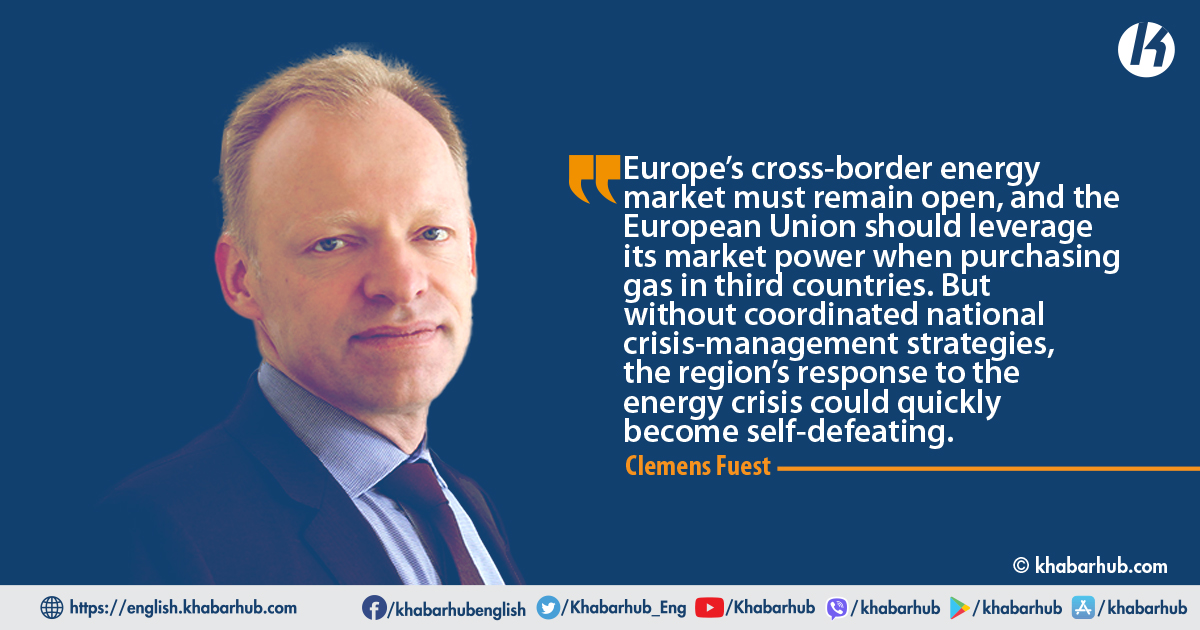The energy crisis – especially the shortage of gas due to a loss of supplies from Russia – is plunging Europe into recession and causing social tensions and distributional conflicts.
European governments are eagerly seeking ways to defuse the situation, but they will succeed only if they cooperate closely.
The cross-border energy market must remain open, and the European Union should leverage its market power when purchasing gas in third countries.
But without coordinated national crisis-management strategies, Europe’s response could become a self-defeating subsidy race.
Sharply rising energy prices have reduced output and consumption alike, with households responding to rising costs by cutting back on other expenses.
Some are already drawing down savings, but many others do not want to touch their reserves, fearing that they will need them later. And still others, of course, have no reserves at all.
Elevated gas prices are central to this crisis, because they affect not only heating bills but also industrial and electricity production.
A policy that limits itself to subsidizing only poorer households and severely affected businesses would avoid both problems, by helping those who actually need the help.
When electricity is in high demand, renewable energies, coal, and nuclear power are not enough. And because the most expensive active power plant determines the price of electricity, higher gas prices have also driven electricity prices sharply higher – both increased approximately tenfold between January 2021 and September 2022.
The depth of the economic and social turmoil will depend very much on how governments respond. Two approaches are possible.
The first is to intervene directly in the energy markets and try to make electricity, gas, and petroleum cheaper with tax cuts or subsidies. Spain’s subsidization of gas purchased by its electricity system is an example of this option.
The other approach is to refrain from price interventions and to focus instead on helping low-income households or severely affected firms with lump-sum transfers.
At first glance, the first approach seems more effective – and it is obviously attractive to politicians who want to create the impression that they are addressing the issue directly. But it has two drawbacks.
First, lower prices for gas, electricity, or petroleum benefit those who consume the most energy, which tends to mean households with higher incomes, bigger houses, and bigger cars.
Not only can this cohort already bear the higher prices without help; it also will end up paying for the subsidy anyway through the taxes the government will need to levy to service the additional debts it has taken on.
The second, and more important, problem is that subsidies or tax cuts will prop up demand by weakening the incentive to reduce energy usage. But since energy has become scarce in real terms, this increased demand will meet an unchanging supply, and prices will have to rise until supply and demand match again.
As a result, a considerable part of the subsidy or tax cut will flow to energy providers, rather than to consumers.
This misalignment is particularly problematic in the gas market, and even more so when subsidies are being designed and implemented at the national level.
After all, with liquefied natural gas terminals at capacity, the gas supply to Europe is not particularly flexible. If a single member state lowers domestic gas prices with subsidies and other states do nothing, the Europe-wide gas price will increase a little, but noticeably more gas will flow into the country paying the subsidy, depriving the rest of Europe of that supply.
Effective energy-crisis management requires European coordination. If each country acts only with its own interests in mind, Europe will fare much worse – and for no good reason.
Moreover, if all countries act this way, they will find themselves in a subsidy race that will leave everyone worse off. If the amount of gas available in Europe this winter cannot be increased by higher price offers (because there simply is no more supply), a subsidy will increase the price by exactly the amount of the subsidy.
It will be as if governments had transferred the money from their balance sheets directly to the gas producers as a gift. Ultimately, consumers will get no relief at all.
A policy that limits itself to subsidizing only poorer households and severely affected businesses would avoid both problems, by helping those who actually need the help.
Unfortunately, owing to the shock of surging energy prices, national governments are under increasing domestic political pressure to intervene directly to reduce prices. Most of these national-level debates do not consider the wider implications of such policies.
Making matters worse, subsidies’ cross-border effects will interfere with other measures that are urgently needed.
For example, one effective way to stabilize the gas and electricity markets is to reactivate decommissioned coal- and oil-fired power plants, and to extend the lifetimes of nuclear power plants.
That would reduce the amount of gas needed for electricity production, and it would benefit all of Europe, not just the country acting in each case.
Effective energy-crisis management requires European coordination. If each country acts only with its own interests in mind, Europe will fare much worse – and for no good reason.
(Clemens Fuest, President of the Ifo Institute, is Professor of Economics at the University of Munich)
Copyright: Project Syndicate









Comment